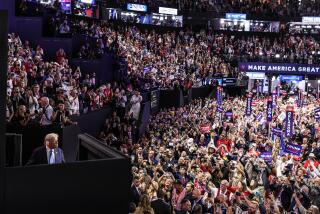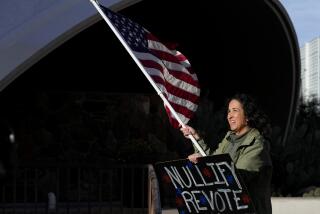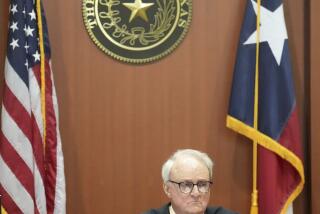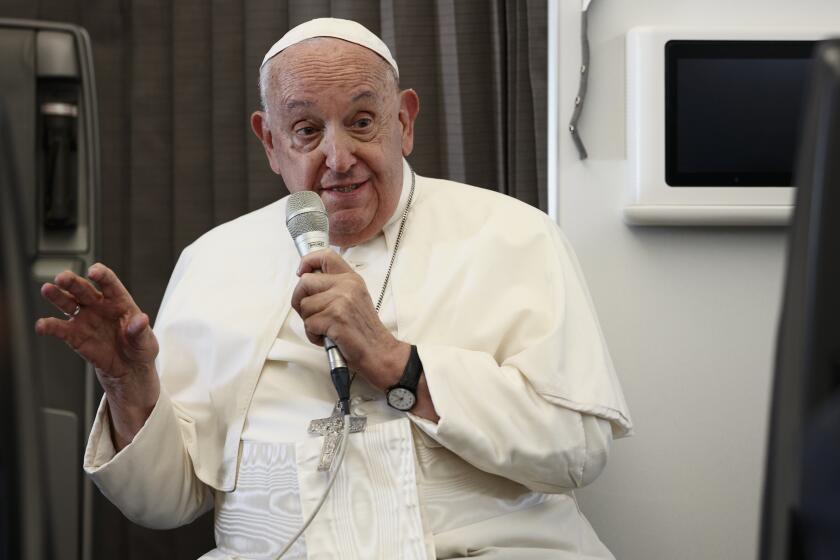Kobach recuses himself from vote counting in Kansas’ neck-and-neck GOP primary for governor
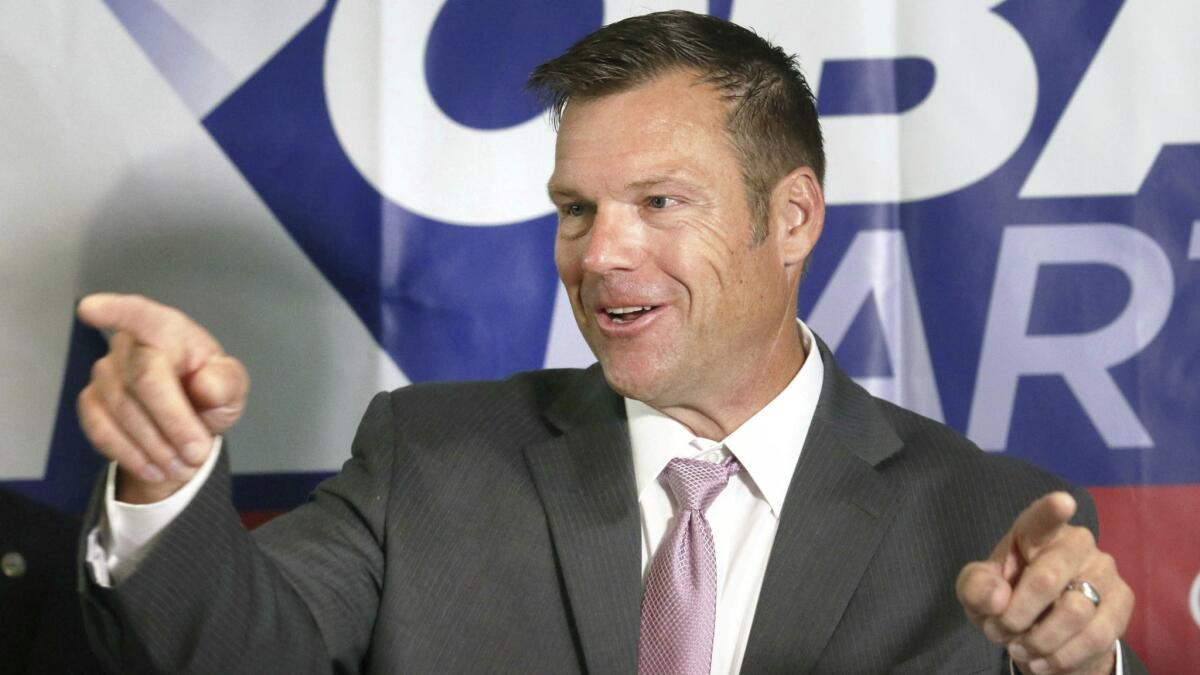
Kansas Secretary of State Kris Kobach said late Thursday that he will recuse himself from overseeing the GOP primary race recount against himself and Gov. Jeff Colyer after discrepancies were discovered between unofficial results from the county and the state levels.
But Kobach said the move will be merely “symbolic” because counties do the work of counting votes.
On Friday, the Associated Press reported that Colyer said he believes Kobach has told counties as part of his job as the state’s top elections official not to accept some legitimate ballots in their hotly contested Republican primary race.
Colyer, who already has accused Kobach of giving county election officials guidance “not consistent with Kansas law,” said Friday on Fox News that he is worried that some mail-in ballots in Tuesday’s governor’s race are not being counted as required. He said he is “not entirely” comfortable with the counting of the remaining votes.
Kobach spokeswoman Danedri Herbert said Friday that Kobach would respond later in the day to Colyer’s demands, including a letter Colyer sent telling Kobach to stop advising county election officials and allow the state’s attorney general to take over that role.
The vote-tallying discrepancies revealed Thursday whittled down the lead Kobach held over Colyer.
Kobach, a hard-line opponent of illegal immigration who campaigned as a staunch ally of President Trump, originally had a 191-vote advantage over Colyer as of Wednesday.
On Thursday, the state elections office said there had been an error in transmitting votes from Thomas County in northwestern Kansas, according to Colyer campaign spokesman Kendall Marr.
“It looks like someone may have flipped a key or something,” Marr told the Washington Post. “That error shortchanged Governor Colyer by 100 votes.”
State elections director Bryan Caskey confirmed the discrepancy.
“I would say it’s not uncommon for there to be mistakes discovered the next morning, keeping in mind [election-night numbers] are unofficial and we are working as fast as possible to get information to the public,” Caskey said. “Election results are a process, not a night.”
Thomas County elections clerk Shelly Harms said they had submitted 522 votes for Colyer on Tuesday night and a clerical error at the secretary of state’s office caused it to be entered as 422 votes.
To complicate matters, the Haskell County Clerk’s Office said late Thursday afternoon that the secretary of state’s website did not accurately reflect their county’s numbers either. The Haskell County results should show 257 votes for Kobach and 220 votes for Colyer, instead of 110 for Kobach and 103 for Colyer.
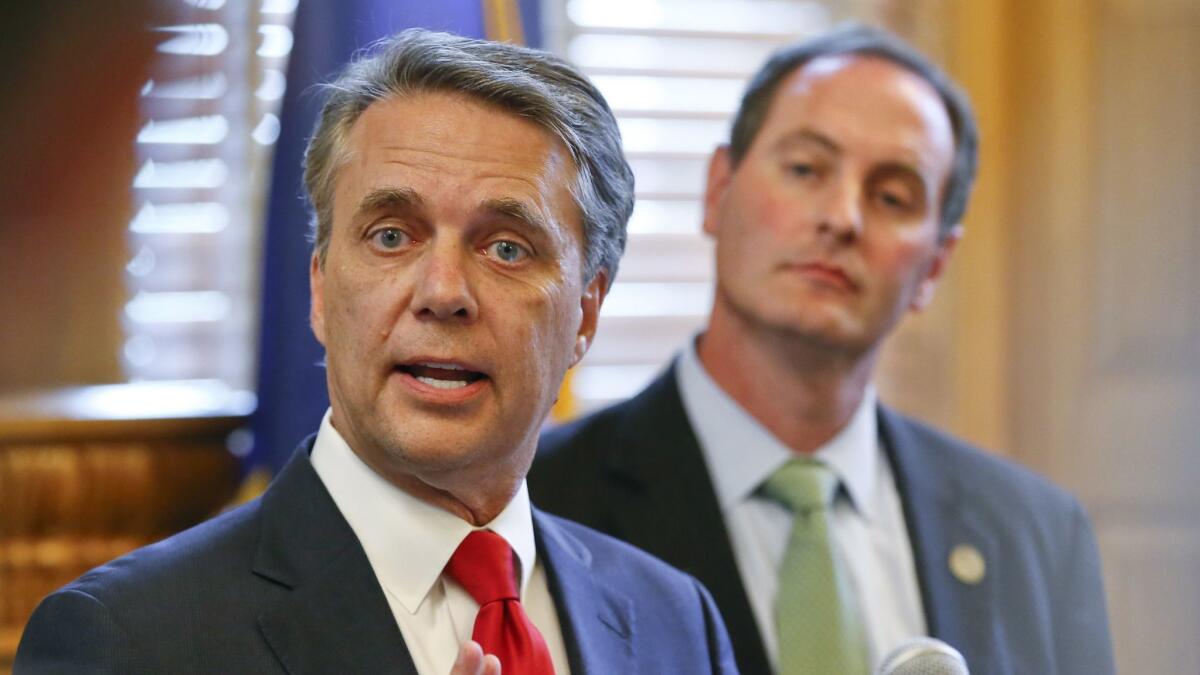
The latest adjustments mean Kobach’s lead over Colyer has been reduced to 121 votes.
Colyer refused to concede the race Wednesday, saying there were still thousands of provisional and mail-in ballots left to count. This newly discovered error only reinforced his resolve, Marr said.
“This is exactly why we have canvass. It’s exactly why we should be checking our math,” Marr said. “This is exactly why Governor Colyer will make sure every legitimate vote is counted in this election.”
Preliminary results Wednesday showed Kobach, who previously served as vice chairman of Trump’s now-disbanded voting integrity commission, had 126,257 votes to Colyer’s 126,066, with 100% of precincts reporting.
Kobach on Wednesday acknowledged that the results of the race could change as provisional ballots were counted but said he would begin campaigning immediately as if he were the winner.
“We have only three months [until the general election], and if we spend a week of that three months doing absolutely nothing, then we will have given our opponents a sizable lead in the footrace that we have,” Kobach said at a news conference Wednesday. “So it is imperative that we begin running … with the full knowledge that I may hand the baton off to Jeff.”
On Thursday, Colyer’s campaign said the governor, like Kobach, would also continue campaigning as if he would be representing the Republican Party in November.
“Well, we are going to continue running as if we are the nominee at this point,” Marr said. “There’s no reason not to continue to operate [so] until we find out otherwise.”
They have reason to want to get a jump on campaigning for the general election: The winner of the Republican primary will face the projected Democratic nominee, state Sen. Laura Kelly, and independent candidate Greg Orman in November. Kelly earned more than 50% of the vote Tuesday, in the state’s first contested Democratic primary since 1998.
Both parties are also aware that, since the 1960s, Kansas voters have not elected consecutive Democrats or Republicans to the governor’s office. This year, the GOP in Kansas also must overcome the additional obstacle of convincing voters that conservative policies can still succeed in Kansas after then-Gov. Sam Brownback, a Republican, enacted steep tax cuts that left the state’s economy, infrastructure funding and education systems reeling.
That may be more of a challenge for Kobach, who has vowed to cut taxes further and reduce the size of state government agencies. Democrats, however, see a Kobach candidacy giving them a better chance of taking back the office in November because he swings so far to the right, according to University of Kansas political scientist Burdett Loomis.
“Their working assumption is Kobach is, for Democrats, the better choice to run against,” Loomis said. “Even with an independent in the race, if you’re [a Democrat] running against a Republican with a ceiling that might be in the mid- to low-40s, you can find a path to win.”
Kansas law does not call for an automatic recount in close races. Candidates may request a recount, and the cost is borne by the candidate or the counties, depending on the result.
At Wednesday’s news conference, Kobach acknowledged his dual role as partisan gubernatorial candidate and nonpartisan state elections official. He said if a recount were requested in the race, the votes would be tallied at the county level but that his office would act simply as a coordinating entity.
Kobach is not required by law to recuse himself from the recount process.
Colyer’s campaign said it had not focused on whether it would ask Kobach to recuse himself from the process in the event of a recount.
“We’re certainly not at a recount right now,” Marr said. “We need to finish the original count.”
The Associated Press contributed to this report.
UPDATES:
1:35 p.m.: This article was updated with an Associated Press report of comments from Gov. Jeff Colyer on Fox News.
This article was originally published at 5:55 a.m.
More to Read
Sign up for Essential California
The most important California stories and recommendations in your inbox every morning.
You may occasionally receive promotional content from the Los Angeles Times.
